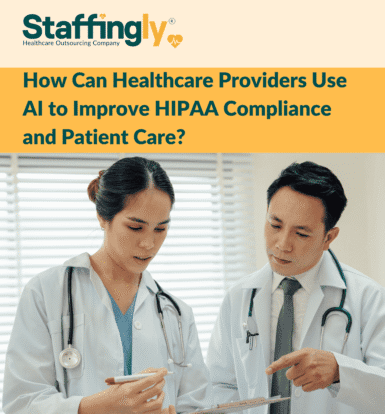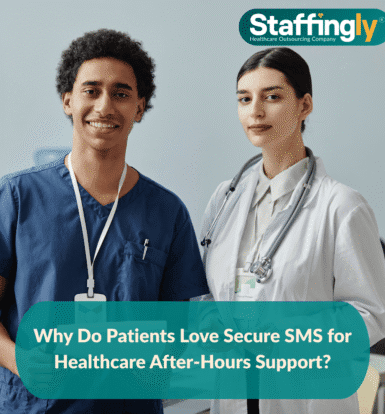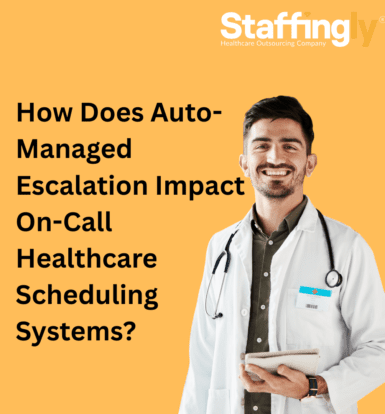On-Demand Outsourcing BPO Services for Healthcare Providers With 24/7 Coverage!
Save up to 70% on staffing costs!
Browse Specialty Staffing Services
How Medical Coding Audits Prevent Revenue Loss and Ensure HIPAA Compliance in healthcare?
Medical coding audits are essential for maintaining the financial health of healthcare practices. These audits not only help detect coding errors early but also ensure compliance with HIPAA regulations, preventing revenue loss, delayed reimbursements, and compliance violations. Inaccurate coding can lead to significant financial setbacks, including denied claims and underpayments, so regular audits are crucial for sustaining the revenue cycle. 💬 “Our practice improved our cash flow and compliance after implementing regular coding audits.” These audits ensure that medical codes

How Can HIPAA Call Support Cut Patient Hold Times in Healthcare by 50%?
In the fast-paced healthcare environment, efficient communication is crucial for delivering quality patient care. Long hold times during phone calls can frustrate patients, delay care, and increase the workload on healthcare staff. HIPAA-compliant call support, combined with advanced chatbot technology, provides a solution that reduces patient hold times by up to 50% while maintaining the security of protected health information (PHI). This article explores how healthcare providers can use these tools to enhance patient experience, streamline operations, and maintain compliance

How Can Healthcare Providers Use AI to Improve HIPAA Compliance and Patient Care?
Artificial intelligence (AI) is transforming healthcare by improving patient outcomes, streamlining operations, and ensuring compliance with regulations like the Health Insurance Portability and Accountability Act (HIPAA). As healthcare organizations manage vast amounts of sensitive patient data, AI offers innovative solutions to maintain HIPAA compliance while elevating the quality of care. This article explores how AI can help healthcare providers achieve both objectives effectively. Strengthening Data Security and Privacy with AI HIPAA mandates strict protection of protected health information (PHI). AI

How Can Prior Authorization Scheduling Enhance HIPAA Compliance in Healthcare?
In healthcare, managing patient data securely while ensuring compliance with regulations like the Health Insurance Portability and Accountability Act (HIPAA) is critical. Prior authorization (PA), a process requiring insurance approval before certain procedures or medications are administered, is a key component of healthcare operations. When managed effectively, prior authorization scheduling can enhance HIPAA compliance by safeguarding protected health information (PHI). This article explores how streamlined prior authorization processes can support HIPAA compliance in healthcare settings. Prior Authorization and HIPAA Compliance

Can Healthcare Clinics Use Wait Time to Improve Patient Knowledge and Care?
In healthcare clinics, patients often experience wait times, whether on the phone or in waiting rooms, as they seek appointments, medical advice, or administrative support. Rather than viewing these moments as mere inconveniences, clinics can transform wait time into a valuable opportunity to enhance patient knowledge, improve patient care, and streamline operations. By leveraging informative hold music and strategic waiting room communications, healthcare providers can educate patients, reduce anxiety, and support doctors in delivering high-quality care. This article explores how

How Can Healthcare Providers Use Call Analytics to Optimize Staffing Forecasts?
In the fast-evolving U.S. healthcare landscape, optimizing staffing in hospitals and clinics is critical for delivering high-quality patient care while managing costs. Call analytics, powered by AI and real-time data, revolutionizes staffing forecasts by predicting call volumes, reducing wait times, and improving patient satisfaction. By integrating solutions like Staffingly’s healthcare outsourcing services, providers can achieve up to 66% cost reductions, 96% patient satisfaction, and hold times under 10 seconds. This guide, tailored for U.S. healthcare providers and patients, explores how

How Does Auto-Managed Escalation Impact On-Call Healthcare Scheduling Systems?
In the high-pressure environment of U.S. hospitals and clinics, ensuring rapid responses to patient needs is paramount. Auto-managed escalation in on-call scheduling systems has become a critical tool to ensure healthcare providers are promptly alerted and can respond effectively to emergencies. This article explores the impact of auto-managed escalation, its benefits, and how Staffingly enhances its implementation to improve healthcare delivery. Key Benefits: The adoption of auto-managed escalation provides significant advantages in healthcare settings: Faster Response Times: Automated escalation ensures

How Empathy-Trained Agents in Hospitals Enhance Healthcare Contentment Under HIPAA ?
In the US healthcare system, patient satisfaction is a cornerstone of quality care, driving HCAHPS (Hospital Consumer Assessment of Healthcare Providers and Systems) scores and fostering patient loyalty. Empathy-trained agents both human staff and AI-assisted systems trained in compassionate communication are transforming patient experience in hospitals and clinics. By blending empathy training with strict HIPAA compliance, these agents enhance healthcare contentment, reduce stress, and build patient trust. Staffingly, a leading healthcare staffing provider, plays a critical role by recruiting and
 Book a Demo to Build Your Team Today!
Book a Demo to Build Your Team Today!


 Read Case Studies
Read Case Studies 



 Virtual Medical Assistants
Virtual Medical Assistants



